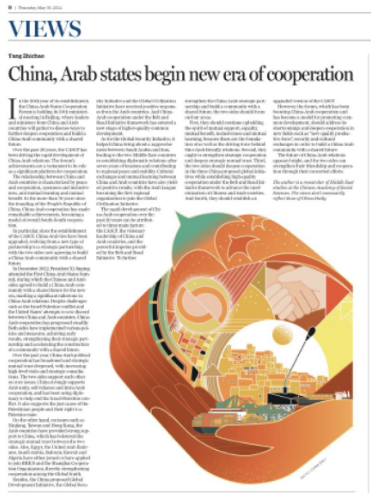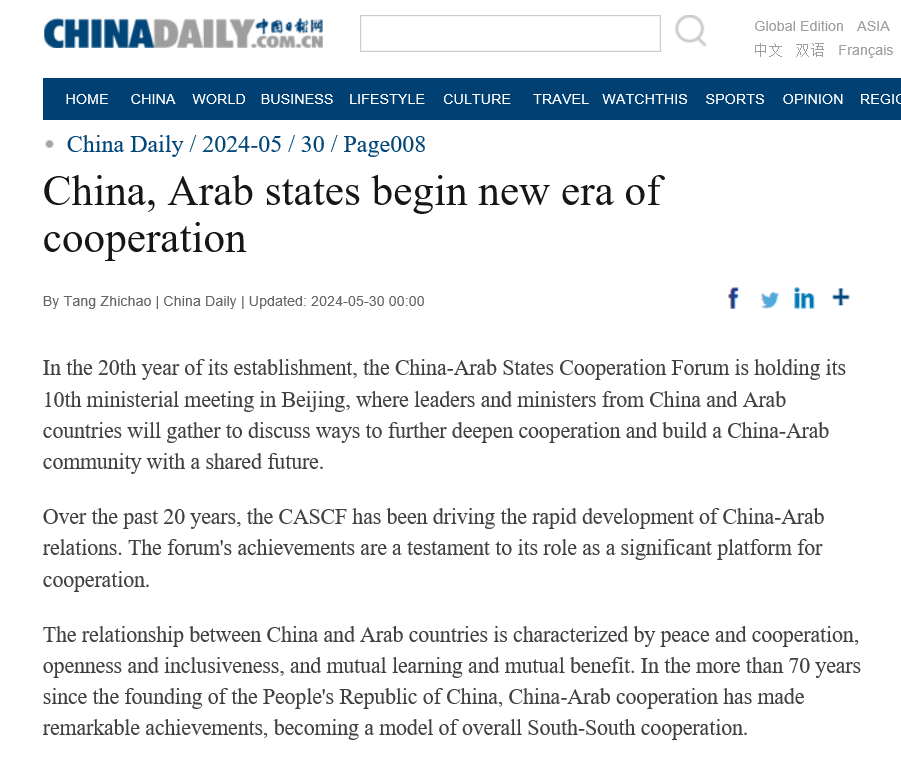
In the 20th year of its establishment, the China-Arab States Cooperation Forum is holding its 10th ministerial meeting in Beijing, where leaders and ministers from China and Arab countries will gather to discuss ways to further deepen cooperation and build a China-Arab community with a shared future.
Over the past 20 years, the CASCF has been driving the rapid development of China-Arab relations. The forum's achievements are a testament to its role as a significant platform for cooperation.
The relationship between China and Arab countries is characterized by peace and cooperation, openness and inclusiveness, and mutual learning and mutual benefit. In the more than 70 years since the founding of the People's Republic of China, China-Arab cooperation has made remarkable achievements, becoming a model of overall South-South cooperation.
In particular, since the establishment of the CASCF, China-Arab ties have been upgraded, evolving from a new type of partnership to a strategic partnership, with the two sides now agreeing to build a China-Arab community with a shared future.
In December 2022, President Xi Jinping attended the First China-Arab States Summit, during which the Chinese and Arab sides agreed to build a China-Arab community with a shared future for the new era, marking a significant milestone in China-Arab relations. Despite challenges such as the Israel-Palestine conflict and the United States' attempts to sow discord between China and Arab countries, China-Arab cooperation has progressed steadily. Both sides have implemented various policies and measures, achieving early results, strengthening their strategic partnership and accelerating the construction of a community with a shared future.
Over the past year, China-Arab political cooperation has broadened and strategic mutual trust deepened, with increasing high-level visits and strategic consultations. The two sides support each other on core issues. China strongly supports Arab unity, self-reliance and intra-Arab cooperation, and has been using diplomacy to help end the Israel-Palestine conflict. It also supports the just cause of the Palestinian people and their right to a Palestine state.
On the other hand, on issues such as Xinjiang, Taiwan and Hong Kong, the Arab countries have provided strong support to China, which has bolstered the strategic mutual trust between the two sides. Also, Egypt, the United Arab Emirates, Saudi Arabia, Bahrain, Kuwait and Algeria have either joined or have applied to join BRICS and the Shanghai Cooperation Organization, thereby strengthening cooperation among the Global South.
Besides, the China-proposed Global Development Initiative, the Global Security Initiative and the Global Civilization Initiative have received positive responses from the Arab countries. And China-Arab cooperation under the Belt and Road Initiative framework has entered a new stage of higher-quality common development.
As for the Global Security Initiative, it helped China bring about a rapprochement between Saudi Arabia and Iran, leading to the two Middle East countries re-establishing diplomatic relations after seven years of tensions and contributing to regional peace and stability. Cultural exchanges and mutual learning between China and Arab countries have also yielded positive results, with the Arab League becoming the first regional organization to join the Global Civilization Initiative.
The rapid development of China-Arab cooperation over the past 20 years can be attributed to three main factors: the CASCF, the visionary leadership of China and Arab countries, and the powerful impetus provided by the Belt and Road Initiative. To further strengthen the China-Arab strategic partnership and build a community with a shared future, the two sides should focus on four areas.
First, they should continue upholding the spirit of mutual support, equality, mutual benefit, inclusiveness and mutual learning, because these are the foundation of as well as the driving force behind Sino-Arab friendly relations. Second, they ought to strengthen strategic cooperation and deepen strategic mutual trust. Third, the two sides should deepen cooperation in the three China-proposed global initiatives while establishing high-quality cooperation under the Belt and Road Initiative framework to advance the modernization of Chinese and Arab societies. And fourth, they should establish an upgraded version of the CASCF.
However, the forum, which has been boosting China-Arab cooperation and has become a model for promoting common development, should address its shortcomings and deepen cooperation in new fields such as "new quality productive force", security and cultural exchanges in order to build a China-Arab community with a shared future.
The future of China-Arab relations appears bright, and the two sides can strengthen their friendship and cooperation through their concerted efforts.
About the author: Tang Zhichao, researcher of Middle East studies at the Institute of West-Asian and African Studies (IWAAS), Chinese Academy of Social Sciences (CASS)
This article was originally published on Chinadaily

